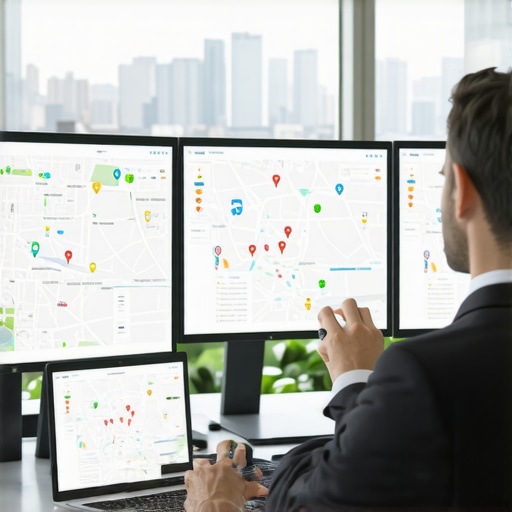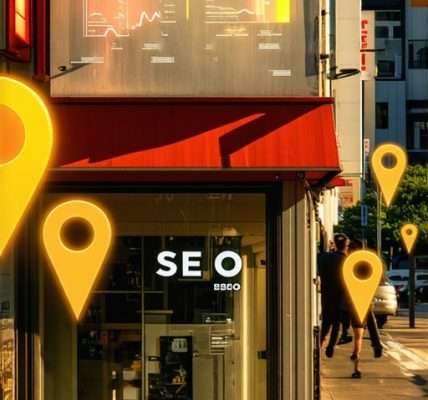Mastering Hyperlocal SEO: The Next Frontier in Digital Marketing for 2025
In an era where consumers increasingly seek immediate, contextually relevant solutions, hyperlocal SEO emerges as an indispensable tool for small businesses aiming to carve out dominant positions within their geographic niches. As digital landscapes evolve, understanding the nuanced mechanisms of hyperlocal optimization becomes critical for professionals seeking to outperform competitors and secure visibility in the crowded local search ecosystem.
The Complex Dynamics of Hyperlocal Search Optimization
How does hyperlocal SEO differ from traditional local SEO, and why does it matter in 2025?
While traditional local SEO focuses broadly on geographic areas, hyperlocal SEO zeroes in on ultra-specific zones—such as neighborhoods, districts, or even street segments. This precision leverages advanced geo-targeting techniques, including hyperlocal keywords, localized content, and map-based strategies, to meet the exact search intent of nearby consumers. As Google refines its algorithms—emphasizing proximity signals and personalized search results—hyperlocal SEO becomes a vital component for businesses targeting immediate communities.
Key Technical and Content Strategies for Hyperlocal SEO Domination
Implementing effective hyperlocal campaigns requires a sophisticated blend of technical expertise and creative content strategies. This involves optimizing Google My Business (GMB) listings with verified, accurate, and keyword-rich information, leveraging schema markup for local business details, and cultivating a robust review generation system that enhances credibility and ranking signals. Additionally, hyperlocal content should incorporate local landmarks, events, and community-specific language to resonate authentically with nearby users.
Advanced Tools and Data-Driven Insights for Hyperlocal Success
Utilize cutting-edge tools such as BrightLocal and Moz Local for citation management and review tracking, ensuring consistent NAP (Name, Address, Phone) data across platforms. Conduct comprehensive GMB audits to identify ranking gaps and opportunities, and deploy competitive analysis to understand the local landscape better. Integrating these insights into your strategy enables a proactive approach to outranking local competitors, especially in the high-stakes Google 3-Pack.
Expert Inquiry: Navigating the Grey Areas of Hyperlocal SEO
What ethical considerations and potential pitfalls should professionals be aware of when deploying hyperlocal tactics in 2025?
While hyperlocal SEO offers significant advantages, practitioners must remain vigilant against practices that could breach Google’s guidelines, such as keyword stuffing or manipulating reviews. Ethical SEO fosters long-term trust and authority, which is crucial for sustained dominance. Open discussions in industry forums and adherence to Google’s evolving policies are essential for ethical compliance and reputation management.
For further mastery, explore comprehensive local SEO techniques at this resource. To stay ahead, consider consulting with industry leaders and sharing insights to refine hyperlocal strategies continually.
Harnessing Hyperlocal Data: The Next Level of Precision in Search Optimization
In 2025, hyperlocal SEO is no longer just about keywords and citations; it’s about harnessing granular data to craft ultra-tailored marketing campaigns. Advanced analytics tools now enable businesses to analyze neighborhood-specific behaviors, traffic patterns, and demographic shifts with unprecedented accuracy. This data-driven approach allows for hyper-targeted content, personalized promotions, and strategic ad placements that resonate deeply with local audiences.
How can small businesses leverage hyperlocal data to outsmart larger competitors in tight markets?
Small firms can utilize platforms like Google Maps API and local social media insights to identify emerging trends and customer preferences within their immediate vicinity. By integrating this intelligence into their content and service offerings, they can build a loyal customer base that feels authentically understood. Moreover, by consistently monitoring local event calendars and community activities, small businesses can participate in or sponsor neighborhood happenings, further strengthening their local presence and trustworthiness.
The Ethical Dimension of Hyperlocal SEO in 2025
As hyperlocal tactics become more sophisticated, ethical considerations come to the forefront. For instance, leveraging personal data must align with privacy regulations such as GDPR and CCPA. Misusing or over-collecting user information risks damaging brand reputation and incurring penalties. Ethical SEO practices emphasize transparency, consent, and providing genuine value to local consumers, fostering long-term trust and authority—cornerstones for sustainable growth.
Are there innovative ways to maintain strict ethical standards while maximizing hyperlocal SEO impact?
Yes, adopting privacy-first strategies like anonymized data collection, opting for opt-in marketing, and emphasizing user-controlled privacy settings can be effective. Additionally, transparent communication about how data is used and offering incentives for voluntary information sharing can enhance trust. Industry leaders advocate for a balanced approach that prioritizes user rights while leveraging local insights for strategic advantage, as highlighted by authoritative sources like Moz’s local SEO guidelines (Moz Local SEO Ethical Practices).
Emerging Technologies and Frameworks Shaping Hyperlocal SEO in 2025
Emerging technologies such as AI-powered chatbots, augmented reality (AR), and 5G connectivity are transforming hyperlocal engagement. Chatbots integrated into Google My Business can provide instant, personalized responses to local queries, enhancing user experience and boosting rankings. AR applications enable virtual walkthroughs of storefronts or neighborhoods, creating immersive local discovery experiences that encourage foot traffic and conversions.
Frameworks like Google’s E-A-T (Expertise, Authority, Trustworthiness) are evolving to incorporate local context, emphasizing the importance of local content validation, credible citations, and community engagement. These developments demand that local SEO professionals adopt a multi-layered approach blending technical mastery, ethical standards, and innovative tech integration.
For more insights on advanced local SEO tactics, visit this comprehensive guide and stay ahead of the curve.
Interested in sharing your hyperlocal SEO experiences or seeking tailored advice? Contact our experts today to elevate your local search presence in 2025.
Leveraging Hyperlocal Data for Predictive Market Insights
One of the most transformative trends in hyperlocal SEO is the integration of predictive analytics. By analyzing historical data and real-time signals, businesses can forecast neighborhood trends, consumer behaviors, and emerging hotspots. This proactive approach allows local marketers to tailor campaigns precisely before competitors even recognize the opportunity.
How can predictive analytics revolutionize hyperlocal marketing efforts?
Predictive analytics harnesses machine learning algorithms to analyze vast datasets, uncover hidden patterns, and generate actionable insights. For instance, by examining foot traffic data, weather patterns, and social media activity, businesses can identify the optimal times and locations for targeted promotions. This not only enhances ROI but also builds a reputation as a community innovator.
According to a recent report by McKinsey & Company, companies utilizing predictive modeling for localized marketing see an average increase of 20-30% in customer engagement and conversion rates (McKinsey Report).
Integrating Voice Search and Hyperlocal Optimization
With the proliferation of voice-activated devices, optimizing for voice search within hyperlocal contexts has become a necessity. Voice queries tend to be conversational and question-based, often including local references such as “closest coffee shop” or “best plumber near me.” This shift necessitates a nuanced approach to keyword strategy, emphasizing natural language and question phrases.
Implementing structured data markup with schema.org can significantly enhance visibility in voice search results. For example, local FAQs, event details, and business descriptions enriched with schema help voice assistants deliver accurate, immediate responses, thereby increasing foot traffic and inquiries.

Advanced Local Link Building in Hyperlocal SEO
Next-level local link building involves cultivating high-authority backlinks from neighborhood-specific sources. Collaborations with community blogs, sponsorships of local events, and partnerships with regional organizations can generate valuable inbound links that boost domain authority and local relevance.
Moreover, creating hyperlocal content—like neighborhood guides or community success stories—serves dual purposes: engaging residents and attracting backlinks from local media outlets or influencers. This strategy not only enhances SEO but also fosters genuine community trust.
What are the most effective ways to measure hyperlocal SEO success beyond rankings?
Advanced metrics include tracking foot traffic via geo-fencing technology, analyzing mobile engagement levels, and monitoring local conversion rates. Tools like Placer.ai provide granular insights into physical store visits and consumer movement patterns, offering a comprehensive view of campaign impact. Combining these data points with traditional analytics creates a holistic picture of hyperlocal performance.
To deepen your mastery of hyperlocal strategies, explore authoritative resources such as Moz’s Local Search Ranking Factors (Moz) and industry-specific case studies. Continuous learning and adaptation are vital in this ever-evolving landscape.
Ethical and Privacy Considerations in Hyperlocal Data Utilization
As hyperlocal marketing becomes more data-driven, respecting consumer privacy and adhering to regulations like GDPR and CCPA is paramount. Ethical data collection practices—such as obtaining explicit consent, anonymizing data, and providing transparent privacy policies—build long-term trust and brand integrity.
Innovative methods, such as privacy-first personalization, focus on delivering relevant content without invasive tracking. For example, leveraging contextual signals like recent store visits or local event attendance can enable personalized offers that respect user privacy while maintaining high engagement levels.
Industry leaders emphasize that balancing personalization with privacy isn’t just a legal obligation but a strategic differentiator. For comprehensive guidelines, consult resources like Moz’s Local SEO Ethical Practices (Moz).
The Future of Hyperlocal SEO: Embracing Immersive Technologies
Looking ahead, augmented reality (AR) and virtual reality (VR) are poised to redefine hyperlocal engagement. Imagine virtual neighborhood tours or AR-guided store walkthroughs that captivate local consumers and enhance their decision-making process. These immersive experiences foster deeper connections and elevate local brand presence.
Simultaneously, the rise of 5G connectivity ensures these technologies will operate seamlessly, delivering real-time, high-quality experiences at scale. Integrating AR/VR with hyperlocal SEO strategies demands a multidisciplinary approach—combining technical expertise, creative storytelling, and ethical considerations—to create compelling, trustworthy, and innovative local campaigns.
For industry-leading insights on implementing these emerging technologies, visit this detailed guide. As the hyperlocal landscape evolves, staying ahead requires continuous innovation and a commitment to ethical, data-driven growth.
Unlocking the Power of Hyperlocal Keyword Clustering for Niche Domination
One of the most sophisticated tactics in hyperlocal SEO involves implementing nuanced keyword clustering that captures hyper-specific neighborhoods, landmarks, and community interests. By leveraging clustering algorithms and semantic analysis, marketers can create highly targeted content clusters that align with ultra-local search intents, significantly improving visibility in niche markets.
How does hyperlocal keyword segmentation enhance search intent alignment?
This strategy ensures that each content piece targets a distinct micro-motif within a community, creating a web of relevance that Google’s algorithms interpret as authoritative and contextually rich. Advanced tools like SEMrush and Ahrefs can facilitate the identification of long-tail and latent semantic keywords, elevating local relevance and decreasing competition.
Expert Inquiry: What are the critical technical considerations for implementing schema markup at a hyperlocal scale?
Implementing granular schema markup, such as LocalBusiness, Store, or Service schemas with precise geo-coordinates, opening hours, and localized offerings, enhances search engine understanding. Ensuring that schema data is consistent across all listings and reflects real-time updates is vital for maintaining credibility and ranking accuracy. The Google Structured Data Testing Tool or Rich Results Test can verify markup integrity and effectiveness. For authoritative guidance, consult Google’s Schema.org documentation and Moz’s Schema Markup Best Practices.
Engage with these insights to refine your hyperlocal content architecture and technical schema, positioning your business as a community-centric authority.
Harnessing AI and Machine Learning for Hyperlocal Content Personalization
Artificial intelligence enables hyper-personalized user experiences by analyzing local behavioral data, social media trends, and seasonal patterns. Machine learning models can predict customer preferences at the neighborhood level, allowing businesses to dynamically tailor website content, offers, and recommendations.
This hyperlocal personalization fosters stronger community bonds and higher conversion rates, especially when integrated with chatbots and dynamic landing pages. Platforms like Salesforce Einstein and IBM Watson offer scalable solutions that analyze complex datasets for actionable insights.
How can AI-driven personalization outperform traditional hyperlocal SEO tactics in 2025?
AI-driven approaches automate the adaptation of content and offers to real-time neighborhood dynamics, ensuring relevance and immediacy. They enable rapid A/B testing of hyperlocal messages, optimize user journeys, and facilitate predictive analytics for trendspotting. Implementing these tools requires a sophisticated understanding of data privacy regulations and ethical AI principles to maintain consumer trust.
To explore these cutting-edge methodologies, consult industry reports from McKinsey & Company and Gartner, which highlight AI’s transformative role in local marketing.
Innovative Use of Augmented Reality for Hyperlocal Engagement
Augmented reality (AR) is revolutionizing hyperlocal marketing by creating immersive neighborhood experiences. AR-enabled apps can overlay digital information onto physical environments, guiding users through local landmarks, promotional offers, or store interiors.
This technology not only increases foot traffic but also fosters memorable brand experiences that resonate within hyperlocal communities. Integrating AR with geofencing and real-time data feeds ensures contextual relevance and maximizes engagement.

Future-Proofing Your Hyperlocal SEO: Ethical AI and Data Sovereignty
As hyperlocal data utilization intensifies, ethical considerations surrounding AI transparency, user consent, and data sovereignty become paramount. Ensuring compliance with evolving regulations like GDPR and CCPA is essential to sustain trust and avoid penalties.
Emphasizing explainable AI models, providing clear privacy notices, and empowering users with control over their data establish a foundation of integrity. Industry leaders recommend adopting privacy-by-design principles and engaging in transparent communication to foster long-term community trust and loyalty.
What are the best practices for integrating ethical AI into hyperlocal SEO initiatives?
Best practices include regular audits of data practices, fostering stakeholder transparency, and prioritizing user-centric privacy controls. Collaborations with local regulators and community organizations can further reinforce ethical standards. For comprehensive frameworks, review resources from the Electronic Frontier Foundation and the World Economic Forum’s guidelines on ethical AI deployment.
Stay ahead by continuously aligning your hyperlocal strategies with the latest ethical standards and technological innovations, ensuring sustainable growth and community trust.
Expert Insights & Advanced Considerations
Leverage Predictive Analytics for Hyperlocal Growth
Utilize machine learning models to forecast neighborhood trends and consumer behaviors, enabling proactive marketing strategies that outpace competitors.
Integrate Immersive Technologies to Enhance Engagement
Implement AR and VR experiences to create memorable, hyperlocal interactions, fostering deeper community connections and increasing foot traffic.
Prioritize Ethical Data Practices
Adopt transparent, privacy-focused data collection methods compliant with GDPR and CCPA to build trust and sustain long-term customer relationships.
Optimize Voice Search for Local Queries
Refine keyword strategies to match natural language and question-based searches, ensuring visibility in voice-activated local searches.
Utilize Hyperlocal Content Clustering
Create targeted content around landmarks, neighborhoods, and community interests to improve relevance and search rankings in niche markets.
Curated Expert Resources
- Moz’s Local SEO Guide: Comprehensive strategies and best practices for local search optimization.
- Google’s Schema.org Documentation: Technical schema markup guidelines for hyperlocal data.
- BrightLocal’s Reports: Data-driven insights and tools for local citation management and review tracking.
- McKinsey’s Predictive Analytics Reports: Case studies on leveraging AI for hyperlocal marketing success.
- Electronic Frontier Foundation: Resources on privacy and ethical AI implementation.
Final Expert Perspective
Mastering hyperlocal SEO in 2025 demands a sophisticated blend of predictive analytics, immersive technology, and unwavering commitment to ethical practices. As local markets become increasingly competitive, strategic innovation and community trust will define leaders. Engage with authoritative resources, stay updated on emerging trends, and continually refine your approach to maintain a dominant local presence. For deeper insights or tailored guidance, contact our team and elevate your hyperlocal strategy to new heights.



